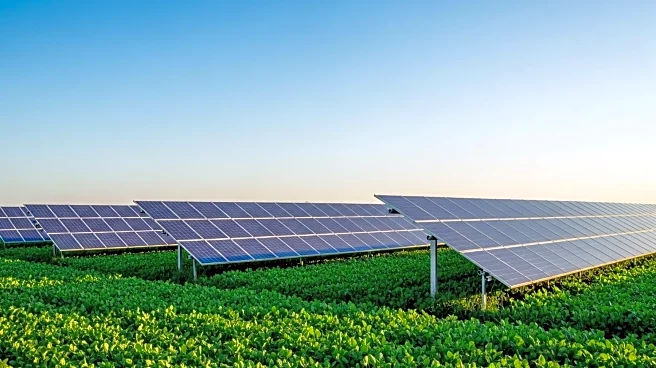What's Happening?
Farmers in California's Central Valley are increasingly installing photovoltaic systems on their fields, earning $50,000 per acre annually and reducing water consumption. This approach, known as agrivoltaics, allows farmers to generate clean power while continuing crop production. The integration of solar panels addresses high operational costs, water scarcity, and erratic weather, providing a reliable income source. Farmers can either construct their own systems or rent land to power companies, both proving lucrative. The solar installations remove irrigation requirements, protecting groundwater reserves and offering financial security during weak growing seasons.
Why It's Important?
The combination of solar panels with agriculture offers significant benefits for farmers, particularly smaller operations. By dedicating portions of their land to solar panels, farmers can buffer against price drops and extreme weather, ensuring consistent income. This financial stability enables farmers to upgrade equipment and preserve their property for future generations. The clean power generated from farm-based solar replaces polluting generators, improving air quality and reducing respiratory illnesses. With over 117,000 farming operations using photovoltaic technology, solar options present a viable opportunity for increased earnings and environmental conservation.
What's Next?
Farmers are encouraged to explore solar options to enhance their income and sustainability. Local contractors can provide insights into land capabilities and financial programs. As more farmers adopt agrivoltaics, the agricultural sector may see a shift towards integrating renewable energy solutions. This trend could lead to broader adoption of clean energy practices, contributing to environmental preservation and economic resilience.
Beyond the Headlines
The integration of solar panels with agriculture highlights the potential for innovative solutions to address environmental and economic challenges. Agrivoltaics not only supports sustainable farming practices but also contributes to the clean energy transition. By reducing reliance on traditional power sources, farmers can play a crucial role in mitigating climate change impacts and promoting renewable energy adoption.










